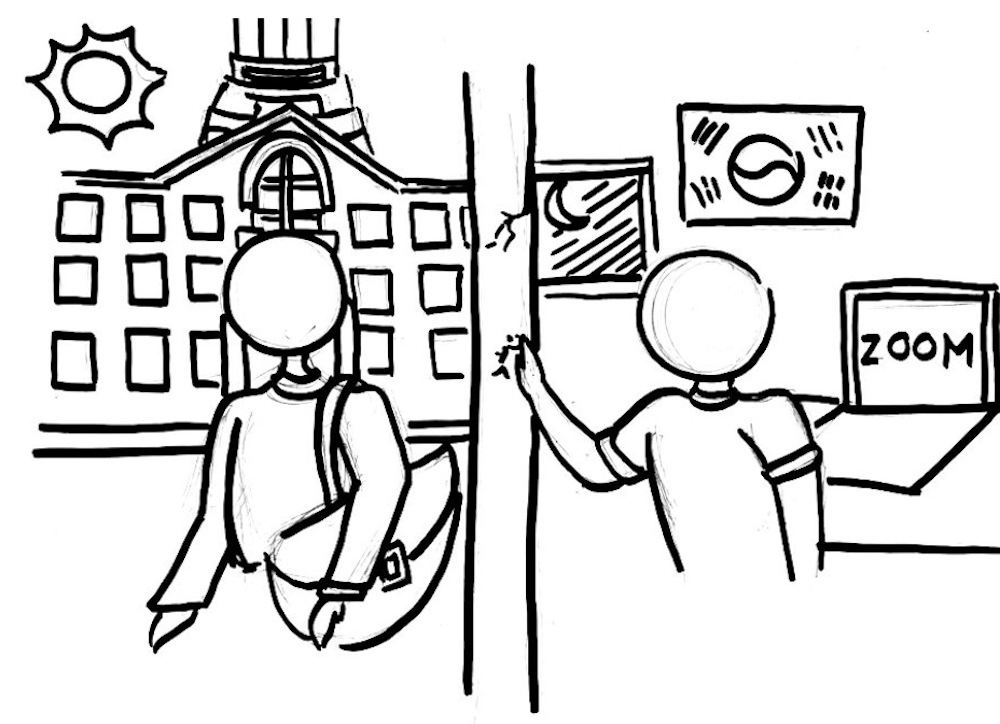A 14-hour time difference from Korea to Princeton is difficult, as anyone I’ve complained to about my sleep schedule can attest. Yet being an international student in the age of COVID-19 means much more than a time difference. Rather, what’s most frustrating is feeling different and oftentimes less important than our United States-based peers. The University must ensure better, equitable treatment of our international student body.
Perhaps what is most difficult about being an international student at this time is the feeling of being overlooked. Whenever I have a class past midnight or an event that is held at 4 a.m. local time, it is not just the time zone that presents an issue. It is also the mentality that comes with feeling that you and your fellow international students have once again been overlooked in a decision that could well have been avoided by a simple adjustment.
Just because international students make up a minority of the student body does not mean that we should have to sacrifice sleep and life to avoid feeling excluded. In his column about international students and club meeting times, Rohit Narayanan ’24 excellently points out that “real leadership doesn’t turn a blind eye to inequities for the sake of simplicity.” This statement especially holds true as we transition into a second semester. As we anticipate the different circumstances that will be brought to the table in the months to come, the University community has an opportunity and responsibility to address the shortcomings of a first semester online.
The inherent flaw with the current approach is the importance that we place on the label “international student.” Rather than a classification based on citizenship, this label paints students living outside the United States with a broad stroke, and what feels like a new and separate identity. This is due in large part to the current hostility towards international students in the United States that has begun to take shape through increased xenophobia and resentment.
But it’s not just that which contributes to a feeling of otherness. It’s the small, seemingly trivial things that have the largest impact. Between not having received the welcome packages that our American resident peers received months ago, to being unable to visit campus during fall break, these small differences accumulate to what ends up being a large impact.
Yes, we are international: that’s the label we are given for coming from opposite ends of the world. But before that, we’re simply students. Our passports might say South Korea, Brazil, or Kenya, but like all students, we applied to Princeton and rejoiced when we got in. We went through the same standardized exams and teenage melodrama, and still struggle through the same problem sets and cry through our papers. We are no different, and we deserve to be prioritized in the same way that students are.
There are many individuals in Princeton’s community who display this much-needed kindness and consideration. In my experience, many upperclassmen and student leaders have been generous and thoughtful when planning events or meetings; for instance, one of my club presidents messaged the international students in our group to ask us about meeting times she should avoid. Many of my professors and preceptors have also been mindful about providing class times and office hours that are convenient for different time zones. These small acts of consideration go a long way: not only do they let us sleep at reasonable hours, they also demonstrate support for our student body.
Yet Princeton, as an institution, can still improve its treatment of the international student body. While I recognize that it is impossible and unrealistic to push for changes in all class times, small changes such as keeping convenient precept times open for international students, or providing some priority in choosing precept times, would be a phenomenal way of showing support. For first-year students, it would be beneficial to provide more variety in class times for freshman seminars, instead of holding most classes between 1:30 p.m. and 4:20 p.m. eastern time, which is highly inconvenient for most East Asian time zones — where a large number of our international student body comes from, according to The Daily Princetonian’s freshman survey.

But more importantly, including the voice of international students when making decisions will be the most effective method in assisting us. Even if we cannot sway decisions or change policies as the relatively smaller group we are, our voices deserve to be better heard. Perhaps international upperclassmen have more of a say in these matters than I myself experience, but the University must recognize that international first-years are undergoing many situations that are unique to our class. For example, many of us are unable to reside in the United States due to immigration policies, whereas upperclassmen are allowed to live inside the country and can thus minimize time zone differences. Keep us in mind, and show that you value our voice: ask for our feedback, but not just once a semester; keep an open channel of communication. One way to do this is to create a committee of international students from different areas of the world that would report specific problems we face both specifically, and collectively.
I cannot speak on behalf of every international student, or even every international first-year. We are all in different situations. In addition, there are definitely students within the United States who undergo similar or even more difficult problems; this is not to undermine any of their struggles. Still, this remains true: our international students deserve better treatment and more representation in decisions. I write not in criticism, but in a mere request for support during these difficult times.
Won-Jae Chang is a first-year from New York and Seoul, South Korea. He can be found at wonjaec@princeton.edu.









